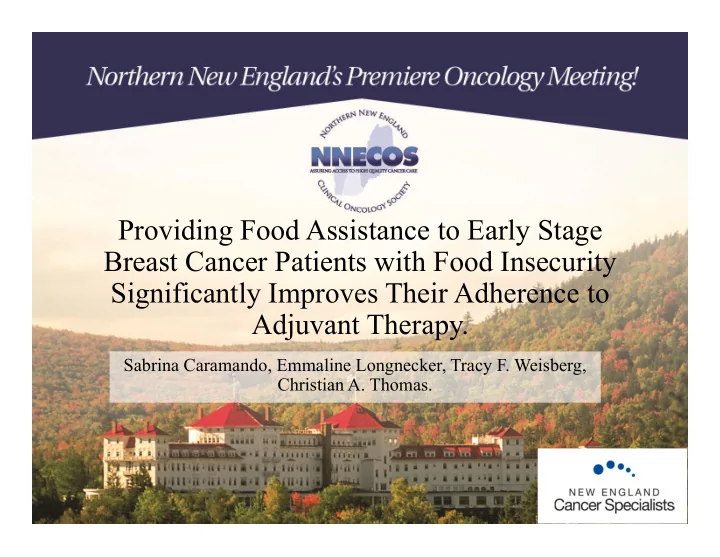

Providing Food Assistance to Early Stage Breast Cancer Patients with Food Insecurity Significantly Improves Their Adherence to Adjuvant Therapy. Sabrina Caramando, Emmaline Longnecker, Tracy F. Weisberg, Christian A. Thomas.
Overview • Background of food insecurity in Maine • NECS partnership with Good Shepherd Food Bank • Introduction to food insecurity research at NECS • Methods • Results • Conclusions & Take-Aways
Background Food Insecurity in Maine • 16% of Maine residents are food insecure - 7 th highest in the Nation • Positive associations with poor health - “Food Insecurity Among Cancer Patients in Kentucky: A Pilot Study” * affordable medication, quality of life, SES, nutritional risk, depression
http://www.downtownbangor.com/event/dirigo-speaks-presents-kristen-miale-president-good-shepherd-food-bank/ • Good Shepherd Food Bank partnership • Patient Reported Outcomes (PRO) survey - Food insecurity question • Food bags given out by financial advisors
Past Research at NECS PRO Symptom Averages • FI and cancer 1.6 patient symptom 1.4 burden 1.2 • Significant 1 differences in PRO 0.8 symptoms 0.6 0.4 - Difficulty sleeping, 0.2 fatigue, pain, mood, & 0 Difficulty Sleeping Fatigue Pain Mood Appetite appetite Food Insecurity Food Security
Current Study • Aim - Correlation between FI and adherence to adjuvant therapy • Does providing food assistance change adherence patterns to adjuvant therapy? - food bags
Methods • Compiled data from January 2017 through June 2018 - early stage (0-II) breast cancer patients - adjuvant therapy (hormone) - indication of FI on PRO survey • Number of months on adjuvant therapy • Case controls → disease, stage, age, gender, timeframe of adjuvant therapy
Results Months of Adjuvant Treatment for Early Stage Breast Cancer FI and FS Patients 14 12 n= 59 Months of Adjvant Treatment 10 n= 59 8 6 4 2 0 FS FI
Results (continued) Months of Adjuvant Treatment for FI and FS Patients 14 n= 59 12 Months of Adjuvant Treatment n= 21 10 n= 38 8 6 4 2 0 FI, received assistance FS FI, no assistance
Conclusions & Take-Aways • Food insecurity impacts adjuvant therapy of early stage breast cancer patients - SES factors - PRO symptom burden • Providing food assistance improves adherence to adjuvant therapy and may therefore influence a patients ability to successfully complete treatment
Works Cited Bayly, J. (2018, September 09). Maine ranks highest in New England for food insecurity. http://bangordailynews.com/2018/09/05/homestead/maine-ranks-highest-new-england-for- food-insecurity/ Simmons, L. A., Modesitt, S. C., Brody, A. C., & Leggin, A. B. (2006). Food Insecurity Among Cancer Patients in Kentucky: A Pilot Study. Journal of Oncology Practice, 2 (6), 274-279.
Recommend
More recommend